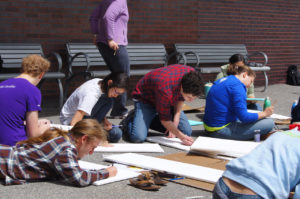AISWARYA KOLISETTY

Aiswarya graduated in 2013 from Olin majoring in ECE, but with a passion for design and software. She organized the first Build Day at Olin, and was a very active member of SWE! Playing volleyball relaxes her, and she was also part of the Olin Ultimate team during her time here. During her summers, she did an internship in Belgium to work with electric vehicles and later did an internship for Tesla.

After Olin
Aiswarya worked at Ford for 2 years after Olin. She then moved back to India because her student visa expired. While at Ford, she had witnessed the way large companies worked and wanted to experience a workplace where sprints are closer to 3 weeks and products do not take 3 years to go into production. In India, she joined Zomato, a Yelp for non American countries. Zomato employs 3000 people with only 60 engineers and functions like a start-up. She will never stop learning, and loves that her current boss is supporting her growth by constantly giving her feedback. In the fast-paced culture of the company, Aiswarya is also learning to just do things and not wait for approval on everything as compared with Ford where all decisions had to go through a long chain of administration.

The Indian Start-up Scene
Compared to the US, India is a much more chaotic place. Start-ups do not worry as much about developing a scaleable product as they do about creating something their customers will definitely want. There are multiple reasons for this different culture: people prefer to pay in cash, labor is cheap, and there are a lot of different languages. People often find a package at their door, decide they do not like it, and send it back without paying anything because they were planning to pay cash. Companies in India would not work well in the US because labor is expensive in the United States. In India, if something is slowing the company down, they can simply afford to hire more people. American companies, on the other hand, scale well in India: Uber can easily hire some drivers that speak the local language and flourish in India. There are so many languages in India, it is difficult to design a product that will translate to all of them. Indian businesses, therefore, target a more narrow language group.
Perception of Entrepreneurship
While at Olin, Aiswarya thought entrepreneurship was about making a design or idea and then getting investors to support the idea. Once she started working for Ford, her perception of entrepreneurship changed. Every decision was made to make sure manufacturing costs were low, product price was high, and that the design was scaleable. The product should be safe and impact people’s lives. When she moved to India, Aiswarya learned that the MVP is very important to communicate ideas. She learned methods to help find hypothesis and develop ways to test them and get unbiased data. For example, in one test she conducted, she was trying to understand when and why customers backed out of the ordering process by testing site traffic, talking to users, and iterating solutions.
